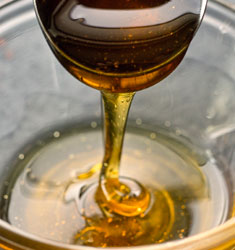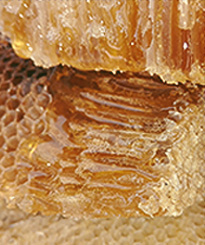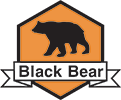About Honey
Honey is a thick and sweet liquid made by bees from flower nectar and this special substance dose not rust or putrefy with time like gold. Hence, honey has been recognizing as precious natural food from old times, and called the food of god by the Ancients. Honey is one of the perfect energy source with no side effect for everyone irrespective of sex and age. For more than 5,000 years, honey has been known for its medicinal and health benefit also these therapeutic qualities have been confirmed by recent medical studies.
Composition Of Honey
Honey contains no fat and essential minerals – calcium, copper, sodium, potassium, manganese, phosphorus iron, zinc and many kinds of vitamins such as the B vitamins, vitamin C, protein in amino-acids, enzyme, and carbohydrates including mixed sugar, dietary fiber.

Benefits Of Honey
Honey provides natural food energy its released into the body at a steady rate, and gives a long sustained energy. Sports nutritionists have found that consuming honey before exercise reduces muscle fatigue. Hence its use by many athletes in all endurance sports such as swimming, cycling, skating, mountain climbing etc.
Honey helps digestion. The anti-bacterial properties of honey are effective in treating digestive problems such as peptic ulcers. Honey is so pure and simple diet that we assimilate easily 100% of it and helps to assimilate other foods.
Honey contains antioxidants that are essential to protect the body against free radicals. A daily dose of honey (even just a spoonful) boost the immune system.
Honey helps the body absorb calcium so it’s the healthy choice for people who are concerned about osteoporosis.
Honey is a natural antiseptic. By absorbing moisture around wounds, honey prevents the growth of bacteria and helps keeps cuts and minor burns clean and free from infection. Honey is highly hygroscopic, thus it helps to moisturize and soften the skin, hence honey has being used for skin care since antiquity.

The Nature Of Honey
All kinds of honey crystallize over time, it’s a natural process of genuine honey and to render it liquid again one has to place with opened jar of honey in a pan or pot that contains water and gently heat the water up.
Tip of Honey Storage
Keep the honey at the room temperature and do not store at cold temperature to help prevent early crystallization.
If you prefer a more firm texture, keep it in the refrigerator.
Tip for Infants
To feed honey to infants under 1 year of age is not recommended, because the honey may contain some bacteria called Clostridium Botulinum which can multiply in a baby’s undeveloped digestive system.
CLASSIFICATION OF THE HONEY
RAW HONEY
According to CFIA(Canadian Food Inspection Agency), “Raw” means that it has not undergone any treatment or processing such as heat treatment (except minimal heating used for the purpose of extraction) or filtering. “Raw” may claim, such as “Unfiltered”. / But raw honey also should be screened by strainer basically while extracting. Raw honey will start to crystallize soon in the container.
LIQUID HONEY
The Honey treated with proper low temp indirectly while extracting to keep liquefied long. This honey also will be crystallized over time (about 2~3 months), but the nutrients in honey are not changed.
CREAMED HONEY
The honey is made by churning the Liquid Honey. This honey will crystallize quickly as like Raw honey, Nutrients in honey are same as Liquid honey.
PASTEURIZED HONEY
The honey with aseptic processing for particular usage.
UN-PASTEURIZED HONEY
The honey untreated with aseptic processing. It’s honey we mostly use.
NATURAL HONEY
The word “Natural Honey” is a typical word for pure honey made by work bees. meaning of the word “Natural Honey” is fairly different with the word “Wild Honey”.
WILD HONEY
The honey made by wild bees in nature. this word can’t be able to use for honey made by work bees. To collect and commercial trade the wild honey is prohibited by law in Canada.
WILD FLOWER HONEY
The honey made by work bees or wild bees with wild flower nectar. Meaning of the “Wild Flower Honey” is exactly different with the “Wild Honey”.
